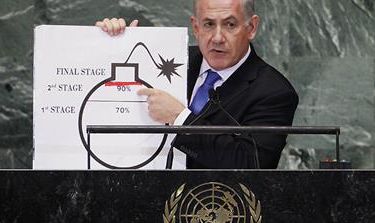IAEA rejects Arab nuclear push on Israel
Member states of UN nuclear agency reject Arab bid to single out Israel for criticism over its assumed atomic arsenal.

The members of the UN’s nuclear agency have narrowly rejected an Arab-backed resolution calling on Israel to join a global treaty limiting nuclear arms.
Following a lively debate at the International Atomic Energy Agency’s (IAEA) annual general conference on Friday, the measure, supported by Iran, was defeated by 51 votes against and 43 in favour with 32 abstentions.
Israel is widely thought to have nuclear arms but has not confirmed so, and is not a signatory to the landmark Treaty on the Non-Proliferation of Nuclear Weapons (NPT).
Although Israel is a member of the IAEA, it is not subject to its inspections except for at a small research facility.
‘Israel-bashing’
The resolution debated at the meeting of all 159 IAEA member states expressed “concern about Israeli nuclear capabilities and calls upon Israel to accede to the NPT and place all its nuclear facilities under comprehensive IAEA safeguards”.
In 2009, the same resolution was narrowly approved by members of the IAEA and in 2010 it was defeated only after intensive lobbying efforts by Western countries.
 |
| Iran has said it intends to enrich uranium only for power station fuel or other peaceful purposes [File: EPA] |
In 2012, and in 2011, Arab states decided not to propose the resolution in order to encourage the creation of a Middle East free of weapons of mass destruction.
These efforts, however, have so far come to nothing, with a hoped-for conference failing to take place in late 2012 as planned.
Iran is under intense international pressure because of suspicions that its nuclear activities, which have expanded greatly over the past decade, are aimed at developing the bomb.
Tehran has consistently denied that it is seeking a nuclear arms capability.
Oman’s ambassador Badr Mohamed Zaher al-Hinai, talking on behalf of Arab states at the IAEA, said that the proposed resolution “could resuscitate” efforts towards a nuclear-free Middle East.
Attacking the “double standards” of Western countries, he called allegations that other Middle East countries were seeking nuclear weapons a “huge distortion of the facts”.
Speaking for Israel, deputy ambassador Daniel Danieli said that the resolution amounted to “Israel-bashing” that “contributes to the politicisation of the IAEA”.